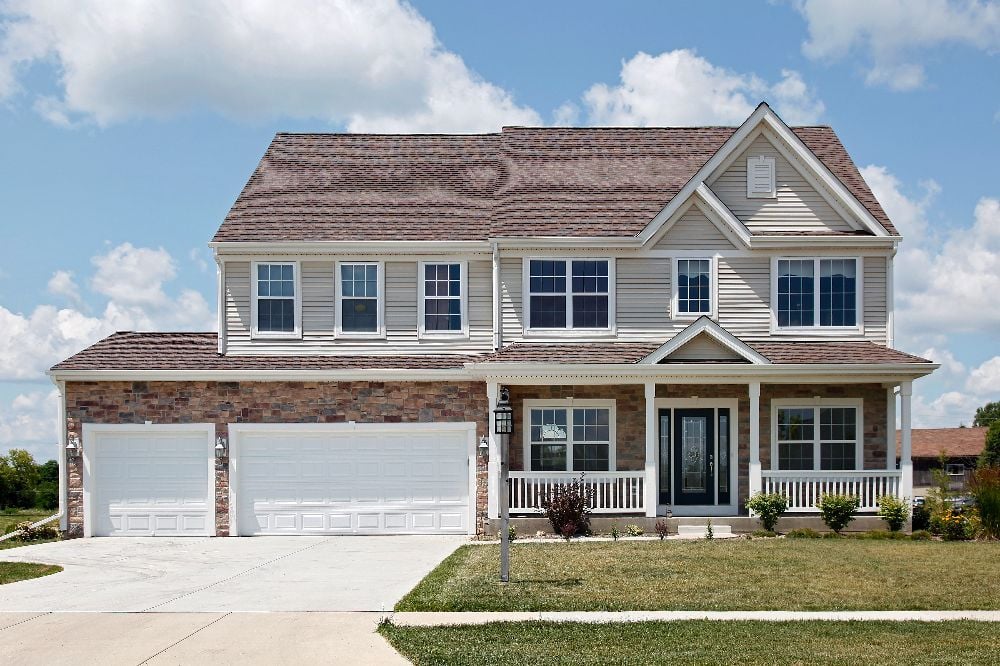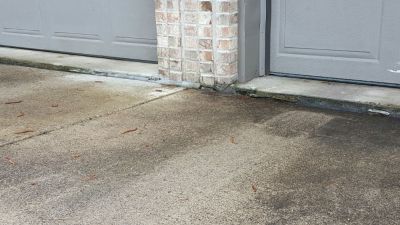What happens if my concrete settles or cracks within my home builder's warranty?
December 14th, 2022 | 4 min. read
By Sarah Etler

Learn about how your builder might use concrete leveling or concrete caulking as a way to repair your settled or cracked concrete.
When you’re finally able to settle into your newly built home, the last thing on your mind is what will happen if you need work done under your home builder’s warranty.
If you notice issues with your new concrete, the first thought you may have is to have it replaced, but this is not always the best option.
Concrete leveling, a process that lifts settled slabs, is a less messy and more convenient alternative to replacement that can be done in less than a day. Concrete caulking is also a quick way to prevent any new cracks from worsening.
This article will walk you through the reason behind why your new concrete has settled or cracked, ways to go about fixing it, how A-1 Concrete Leveling works with home builders for warranty work, and discusses why replacing the concrete altogether isn’t always the best idea.
Why did my new concrete crack or settle?
It can be frustrating or concerning to see your freshly-poured concrete develop cracks or begin to settle, but this is an extremely common occurrence.
Concrete settling around new homes is most common in the first 5-10 years after a home is built.
When a new home is being built, all of the soil around it is dug up and moved around in order to install the basement or foundation and begin building the rest of the home.
All of this displaced soil is usually put back without proper compaction, as it’s very difficult to get close enough to the home’s foundation to effectively compact the soil.
When new concrete is put on top of soil and sub-material that hasn’t been properly compacted and that hasn’t had time to settle naturally, it will settle right along with the soil as that process takes place.
When the concrete settles with the loosened soil, it can cause trip hazards, voids underneath the concrete, and cracks to appear as the slab moves. The most common areas around a new home with these issues are driveways, front steps, front walkways, garage floors, and back patios.

How to Fix Newer Concrete
Your home builder will likely already have a plan in place in order to repair your settled concrete with the methods mentioned in this section.
Concrete Slabs Settling
Concrete leveling is usually the best way to reverse concrete settling. It’s quick, cost-effective, and actually helps fix the root cause of settling: an unstable base.
To level concrete, a professional concrete leveling team will drill small holes, about the size of a quarter, in the affected slabs, then pump a strong leveling compound through the holes, underneath the slab.
The pressure from this compound under the slab will lift it into a level position, and it will cure and harden in order to create a new, stable base for the concrete slab to sit on.
Concrete Cracking
Unfortunately, once concrete cracks, there’s no way to undo it without total concrete replacement. Most of the time, replacing concrete for a few small cracks is unnecessary and comes with additional hassle and risk.
Instead, caulking the cracks is a great way to minimize the chances for the crack to get bigger and help protect the concrete slab from other forms of damage and future settling.
The caulk prevents water from entering, which can erode away the soil under the slab, or enlarge the crack during freeze-thaw cycles.
To caulk concrete cracks, a professional will usually grind the crack slightly, apply a polymer caulk, then smooth it out and finish it to help blend it into the concrete texture.
How A-1 Works With Homebuilders for Warranty Work
A-1 Concrete Leveling partners with homebuilders to provide their customers with a convenient and hassle-free repair.
We work with builders to fill voids under concrete slabs, caulk any breaks or cracks that appear throughout the concrete, and lift settling concrete slabs with our specialized leveling process.
However, an important part of our job is to determine if the quality of the concrete is the concern, or if the ground settling is causing the issues. There’s not much we can do for concrete that is chipping or crumbling, but we can help with crack repair and slab settling.
Why not just replace the concrete under your new-home warranty?
Not only is concrete replacement a huge headache, but it also comes with far more risks than concrete leveling, like a high likelihood of resettling and the potential for a bad batch of concrete.
Because concrete moves and settles with the soil it’s poured on top of, the concrete is only as good as the ground it’s on. If the concrete is placed on loose soil that hasn’t been compacted at all, it will surely settle relatively quickly.
With this in mind, replacing concrete doesn’t make much sense in a new-home situation, as the soil where it will be re-poured is usually not adequately compacted to prevent settling, and can actually accelerate future settling.
Also, re-disturbing the soil in order to replace the concrete will make it easier for the concrete to settle again. Replacing concrete doesn’t actually do anything for the actual reason the concrete is settling.
Instead, concrete leveling adds strong material under the slab to act as a solid base for the concrete slab to rest on, essentially getting to the root cause of the settling itself.
Your Next Steps
If your new home has cracks or settling concrete, speak with your builder about the issues you’ve noticed and learn about their protocol for warranty repairs.
We partner with many home builders to provide a convenient solution to problematic concrete, so it is likely they will recommend concrete leveling or crack caulking as the best route to achieve the results you are looking for.
In the meantime, you can continue learning all about concrete repair. The following are some of the resources available on our Concrete Academy that will help you get more familiar with concrete leveling, concrete caulking, and more!
Sarah Etler joined A-1 Concrete Leveling after receiving her Bachelor of Arts degree in English from Northern Kentucky University. As A-1's Content Marketing Manager, she works closely with industry experts to produce content that will best answer questions related to concrete repair and maintenance practices. Sarah loves living a life full of discovery and is excited every day to see what new things she can learn and share with those around her.